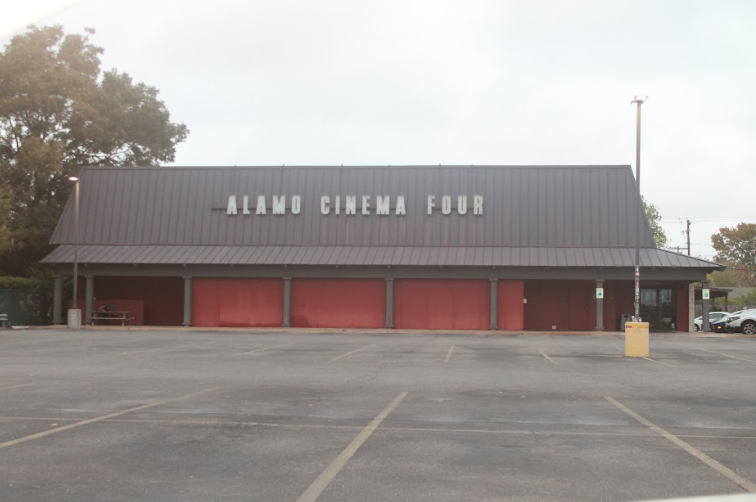Austin’s Own Awesome Alamo
LIGHTS, CAMERA, ACTION The Alamo drafthouse has multiple locations located around Austin. It was founded in Austin and now has locations across the country. photo by Zia Harvey
December 19, 2022
Founded and headquartered in Austin, the Alamo Drafthouse is a nationwide theater chain with a history in Austin spanning 25 years, priding itself as being the premier destination for cinephiles. As stated on their official website, what distinguishes the chain from other competitors, most notably, is its expansive locally-produced meal and beverage options and strict movie-going etiquette.
While the Drafthouse now has over 50 operating locations across the United States, with plans to add onto the list, the theater chain’s very first location was not even a fully functioning theater room. Doug Peña, manager of the Drafthouse’s South Lamar location, has worked for the theater chain for many years, eventually leading him to become familiar with the Drafthouse’s beginnings: a business venture of a married couple, who had built a one room second-run theater that had a single operating projector, by hand.
“The original Alamo Drafthouse was located on Colorado Street,” Peña said. “It was basically a converted parking garage that would turn into a movie theater. [Tim and Karrie League] took the simple idea of watching a movie, being able to enjoy some beer and some food while you watch it, and quickly found also no talking – ‘if you talk we will kick you out’ – blended together really well, so much so that they could expand and add locations.”
For many customers, the strict no talking and film etiquette policies help in creating an uniquely immersive experience out of the Alamo Drafthouse’s screenings. Audio Visual Production teacher Vanessa Mokry said the Drafthouse ensures that customers, such as herself, can enjoy a film to the fullest because of these policies.
“[The Alamo Drafthouse is] a place that respects movies,” Mokry said. “…It’s a place, sometimes it’s spoken, sometimes it’s unspoken, where people are just there to enjoy the movie and respect each other. You don’t tend to have people talking or doing other obnoxious things that interrupts your enjoyment of the film.”
In addition to employing its no talking and no phone use policy, the Drafthouse also hosts pre-film events and shows made specially for the movie screened directly after to add to its customers’ experiences. Ty Denton is the manager of Austin Books and Comics, a position he has held for nearly twelve years. Due to his extensive knowledge of comics, he was asked by the Drafthouse to record trailers, voice overs, and host live events to be screened at locations around Austin before certain superhero and action films.
“Sometimes they ask me to do a little pre-show, where I’ll stand up, and then I do a little quiz, or I’ll do little games,” Denton said. “For “Captain America: Civil War,” I had people do a push up contest or see how long they could keep their hands in ice, and I gave them little prizes.”
However, due to the COVID-19 pandemic, the Alamo Drafthouse could not continue these shows or even film screenings for quite some time. As a manager, Peña responded to this dilemma by placing more emphasis on providing for the Drafthouse’s customers’ love for classic films.
“We’re still feeling the effects of the film industry shutting down because it takes so long to make movies,” Peña said. “Sometimes it takes five to 10 years, especially if you’re looking at something like “Avatar,” that takes that long to make, so we’re still filling in a lot of holes with repertory films… because there’s still not a lot of content.”
Considering how affected even the largest production companies and theater chains were by the COVID-19 pandemic, one can imagine how less commercial filmmakers and chains could have been greatly troubled by the pandemic. In spite of past hardship, however, Peña nonetheless believes that the future is full of opportunity and chances to uplift artists most in need of support.
“I think Alamo is going to continue to promote some of the best films that we can find that need help,” Peña said. “You’ve got films like “Everything Everywhere All at Once” that, in all of Texas, played only at this location for its first week or two, and it did really well. We’re really happy to lend a hand to smaller studios and smaller films like that, and I think we’ll continue doing that and hopefully make headway into promoting international films, independent films, and more artistic and creative projects as well.”


